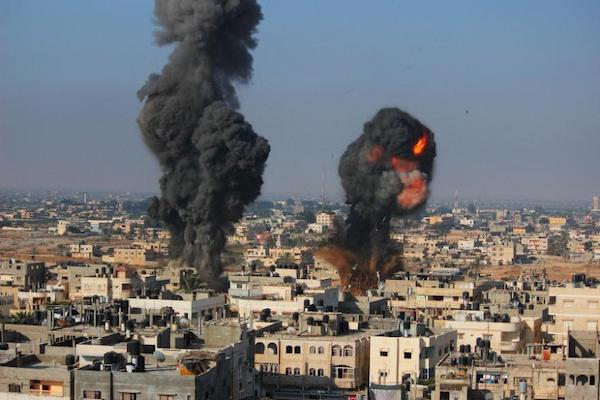Amid the increasing number of the deaths left by the heavy Israeli bombardment of the Gaza Strip and broadening range of the rocket responses from the Palestinian groups, the war is raging. With the Israeli leaders threatening to launch a ground offensive, the diplomatic efforts to broker a ceasefire are going nowhere.
image1
As a result of these conditions, speculations suggest that the Israeli political and military seek lengthening the war for the weeks and even months to come. This promotes a question: Can the Israeli regime fight a long war against Gaza?.
Home challenges
An important part of the reasons for the Israeli regimeís inability to prolong the course of the war must be sought in the internal developments of the occupied territories and the confrontation with the Palestinians.
First, in recent days, the missile strikes of the Gaza-based resistant groups took aback the Israeli military and political leaders. Hamas for the first time fired at Israel a new missile with 250-kilometers range and a stronger and more accurate warhead. Confident of their military efficiency in the face of the Israeli aggression, now the Palestinians are talking about more surprises to come. Abu Hamza, the spokesman to the Al-Qassam Brigades-Hamasís military wing- on Sunday commented on the rocket attacks on the occupied territories, saying that there are more "enemy-astonishing" surprises. "Our missiles reached Khudira and Tel Aviv," he noted. If the continued Israeli strikes can trigger a new intifada (uprising) in the Palestinian territories, the new one will be a missile intifada.
Second, in the past few days, Israeli intelligence bank, which should provide Tel Aviv leaders with data on where to strike, has gone unprecedentedly limited, with the airstrikes majorly targeting official Hamas offices and homes of the movementís leaders- all devoid of a considerable impact on the military strength of the Palestinian resistance. Therefore, less than a month after start of the war, the Israeli regime is expected to run out of data on strategic targets and resort to destruction of the residential areas that would trigger strong international criticism against Tel Aviv heavy for massacring Gazan civilians.
On the opposite side, the Hamas database is full of strategic and vital economic, military, infrastructural, and political targets in the occupied territories. Should the war go on, Palestinian missiles can deal hard blows to the Israelis.
Third, lengthy war will have undeniable internal costs for the Israelis, especially Benjamin Netanyahu. The spread of internal chaos is one of the major internal challenges in the occupied territories, which has become a problem for Netanyahuís cabinet in recent days. The escalation of the conflict between the Palestinians living in the occupied territories and the settlers will cause an internal security crisis. With the expensive Israeli air defense, Iron Dome, proving inefficient in intercepting the Palestinian missile barrages, longer war can kill more Israeli soldiers in the battleground or Israeli settlers by the rocket attacks- an outcome that can complicate the situation for Netanyahu. While Netanyahu has sought to mobilize right-wing parties to support him with the start of the war on Gaza, this has not happened so far and even has widened the gap amongst right-wing spectrum elements. Bearing witness to this widening gap is the recent remarks by the former Defense Minister and leader of Yisrael Beiteinu party Avigdor Lieberman who lashed out at Netanyahu for his Gaza war policy and admitted the Israeli weakness countering the Palestinian resistance.
Possibility of regional-level tensions with Axis of Resistance
Another factor keeping the Israelis from the power to fight a lengthy war against Gaza is the regional developments. The possibility that a massive confrontation can spiral into a full-scale war involving the Axis of Resistance has been a debate of the Israeli leaders and the Resistance camp. Currently, Syria can help Gaza groups punish Israeli for the regimeís attacks on the Syrian territories as Damascus resources are now freed up after defeating the foreign-backed terrorists. Also, Lebanese Hezbollah, Iraqi groups, Yemenís Ansarullah Movement, and other wings of the Resistance camp have asserted readiness to respond to the Israeli hostilities in Gaza and Al-Quds.
Israel crimes condemned internationally
Another factor tying the Israeli hands for a long-term war in Gaza is the international pressure. The international community, especially the Muslim world, strongly condemned the assaults in Al-Quds and the ethnic cleansing and the human rights violations by the Israelis, and a global wave is in the making against Tel Avivís actions. Protesting voices are on the rise, even in the Western countries that have always been ignorant of the Israeli occupation. Social media platforms play an important role in the rapid and less distorted transmission of news to the outside world, and this thwarts the Israeli attempt to cover up their crimes against Gaza people. Odds are that longer war along with heavier bombardment on the civilians in Gaza, the worldís most densely-populated tract of land, can lay the foundation for a universal uprising against the Israeli regime.











